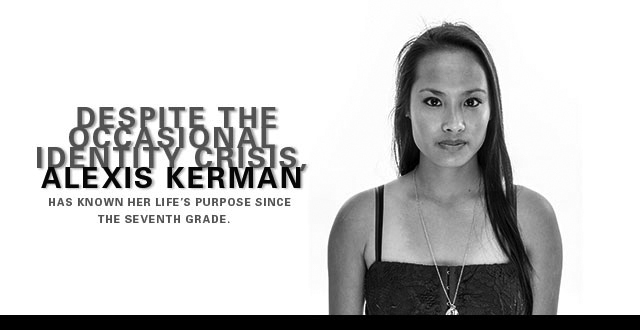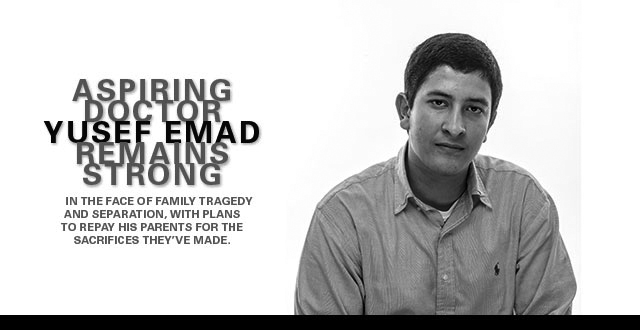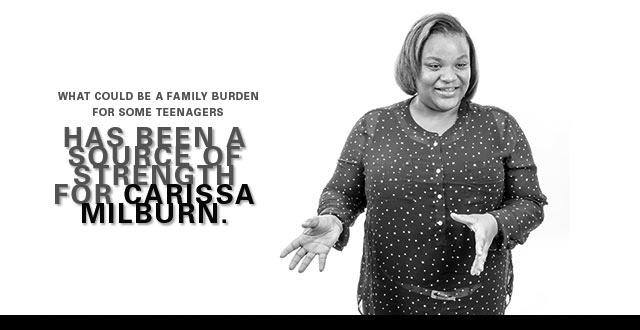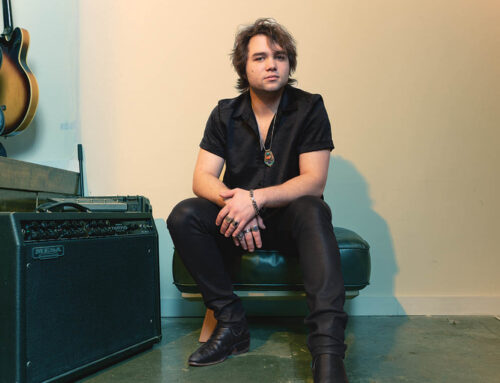Growing up, earning good grades, pursuing a talent and gaining college acceptance is tough, but imagine doing so in the face of rocky life transitions, family separation or an incurable disability. Complicated circumstances can become an excuse for teens to escape down a destructive path. For a few Preston Hollow high school seniors who will graduate this month, however, challenges are reasons to strive for a better future. Their determination and support from teachers, friends and family have driven them to succeed.
Petite and slender with fine features, the unassuming Alexis Kerman spends most of her free time killing it on the Ultimate Frisbee field.
Having struggled to fit in at school, she has carved out her place at Hillcrest High as captain of the coed team — no ordinary feat in the male-dominated sport — and she’s leading her players to the state competition this month.
Right now, “it’s Frisbee or sleep,” she says. “Without Frisbee, I don’t know how I would have gotten through this year.”
All her life, Alexis has pondered the question, “Where do I belong?” — from her abandonment at a hospital in Ho Chi Minh City, Vietnam, to her shocking 11th grade transition from private to public school.
Alexis weighed just 10 pounds when her parents adopted her at 9 months old — the size of a newborn, says her mother, Kay Kerman. The doctor deduced that Alexis probably was born about three months premature. The family lived in Asia for the next few years and had two more biological children.
Growing up, Alexis struggled through the angst typical of adopted children. As a little girl, after minor disagreements with her family, she’d pack a bag, declare, “I’m going back to Vietnam,” and march down the street outside her
Preston Hollow home en route to her birth country more than 9,000 miles across the Pacific Ocean.
“I’d make it to the stop sign and realize I wasn’t going to get very far,” she says.
The tension worsened with age. The fascination surrounding the cute baby years faded, and routine moments became awkward. Alexis has to explain her place in her all-white family — from being seated in a restaurant (“Are you with them?”) to registering for high school (“What is your relation?”) to simply hanging out with her brother (“Is that your boyfriend?”).
She knows almost nothing of her biological parents. The adoption center provided a police report with their names and a note that Alexis had been abandoned. She tried searching for them online without success.
“Your parents bring you into this world,” she says, “and they’re supposed to be the ones who love you the most.”
She soon realized that none of that mattered so much.
“I’m here; I’m blessed.”
So blessed that she was able to attend a top-notch private school in Preston Hollow. That is, until she decided she needed a change. Alexis moved from the Cambridge School of Dallas to Hillcrest halfway through high school. She knew it would be different.
“I just wasn’t sure how different,” she says. “I’ve pushed myself so much harder.”
Alexis is in the top 15 percent of her class and found her niche on the Ultimate Frisbee team. Out of the 32 teams competing at state, only five include girls. Hillcrest coach James Wright says Alexis holds her own against the boys on the field.
“She has the right attitude,” Wright says. “She’s very sweet but also has a competitive switch that she can turn on.”
Wright says that after Alexis graduates, the team won’t be the same, particularly in regard to generating interest among girls.
“She acts as a role model to the other girls,” Wright says. “She shows that women can compete in the same realms as men.”
Alexis is taking that mentality to the next level, pursuing a career as a military officer.
A space camp she attended in seventh grade sparked her interest, which shows no signs of burning out. She has finished the rigorous application process for the United States Air Force Academy and the United States Naval Academy —both of which include multiple essays and nominations from her congressman, senators or the vice president.
She says it’s easy to become disillusioned with the idea of serving one’s country, particularly in a place like the United States, where political tensions run high. For Alexis, it’s deeper than that.
“It’s about life, liberty and the pursuit of happiness. That is what is so important for me to protect and fight for. I’ve been given that; I’ve been given everything.”
Even if she doesn’t gain acceptance to one of the academies, she’ll apply again while attending her freshman year of college at Texas A&M University or The Citadel Military College of South Carolina, where she hopes to join ROTC and continue playing Ultimate Frisbee — even though her academic credits likely won’t transfer.
“It’s hard finding a purpose in life, but I feel like I’ve found mine,” she says. “I’m going to get there; I will get there.”
During his freshman year at W.T. White High School, Yusef Emad almost gave up on band.
“The bullying was getting bad,” he says. “Freshman year was my hardest year.”
Yusef is Muslim, and other kids often labeled him a terrorist. One evening after a concert, someone yelled a racial slur outside the band hall in the presence of Yusef’s mom.
“She was upset and wanted to tell the principal, but I told her to just ignore it,” he says, following the advice of two friends, Mirtala Martinez and Jackie Toribio, who convinced him not to quit over a few senseless bullies.
“The only thing you can do is ignore it.”
It worked. The bullying eventually stopped.
Yusef has played the bass clarinet in band since sixth grade and plays the saxophone in the jazz band. He excels in science, and after he completes basic courses at Brookhaven College, he plans to enter the pre-med program at Texas Tech University and become a doctor.
Phillip Potter, the assistant band director at W.T. White, describes Yusef as “an incredibly high achiever.”
“He’s always challenging himself to be a better player,” Potter says. “He’s really passionate. We think he’s going to do great things.”
This past year, though, Yusef has seen his father only via Skype. His father has been on contract as a translator in Afghanistan for an unspecified amount of time. They’re told he’s in a safer region of the country, but that hasn’t relieved all the fears associated with such a separation.
“We still worry every day,” Yusef says. “What if something happens to him?”
His parents moved from Kabul, Afghanistan, to the United States, where they married and started their family of three boys, Yusef being the middle child. A certified pilot, his dad struggled to find work after his company, Eastern Airlines, went bankrupt in the 1990s. He became a linguist, working as a translator to train other pilots in various parts of the country from El Paso to Washington, D.C.
In his father’s absence, Yusef and his brothers grew close with their uncle (his mother’s only local sibling). They spent many an afternoon at his house in McKinney learning how to change the oil in a car, building birdhouses and picking blackberries from the backyard garden.
Then came the day that Yusef’s uncle began slurring his speech, and the family soon learned he had several tumors scattered throughout his brain. Survival was not likely.
“It was unexpected,” Yusef says. “He was the last guy you would think would get cancer.”
“You could tell in his face that he was going to die soon,” he says about his uncle’s last days. Headed north on the highway, trying to make it to his bedside, Yusef got the call.
That was his junior year of high school, and just a few months later, his dad left for a job he couldn’t refuse in Afghanistan.
“At first, I was mad at him,” Yusef says, “but then I understood that he has to provide for us. It hit me hard, but it affected my brothers more.”
They stay in touch via a computer screen, talking about life, school, the future and volleyball, their favorite family pastime and a ubiquitous sport in Afghanistan — one that Yusef wishes was offered for boys at schools here.
“He tells me to keep practicing so when he comes back, we can all play together.”
His dad will be home this month long enough to participate in their community’s annual Islamic spring picnic. And before returning to Afghanistan until at least the end of the year, he’ll get to watch Yusef receive his high school diploma.
Yusef not only understands and accepts his family’s less-than-perfect circumstances, but also realizes they are what have allowed him to succeed. And he plans to return the favor someday.
“Maybe when I graduate [college], I can buy them a house.”
Carissa Milburn is described as self-motivated, dependable, hardworking and honest. She likely gleaned a few of those positive traits from her Army dad.
“I’m a Daddy’s girl,” she says with a smile. “I’m closer to my dad than anyone else.”
So, when he came back from the Iraq War disabled, Carissa took on the challenge of helping her mom care for him while pursuing an education.
The war exacerbated his onset of glaucoma and diabetes, which has affected his vision and ability to walk. Most days after class at Hillcrest High School, Carissa heads straight home to her father’s aid. The family must make sure he eats and take him to his many doctor appointments each week.
Her dad, who once was more lively and talkative, also suffers from post-traumatic stress disorder. Although he doesn’t open up much about it, she can see the toll the war has taken. He no longer likes action movies, cringes at the sound of helicopters and often awakes from nightmares in a sweat.
“He hasn’t been himself since the war,” Carissa says.
Breanne Hill, who works in the counseling office at Hillcrest, says that for a teenager, Carissa has a rare ability to balance her responsibilities in life, always being there for her family and friends without sacrificing her own goals in the process.
“It’s hard to find that balance,” Hill says. “She is a phenomenal girl. I always brag on her. If I had 230 of her, the school would be perfect.”
Hill met Carissa while establishing the club Celebrating Sisterhood, a mentoring group geared toward at-risk African-American girls. Hill reaches out to students who are prone to struggle in school. Carissa could have been one of them but instead acted as a leader in the group when it launched.
“She joined the group, serving as a role model and mentor for the other girls who aren’t quite there yet,” Hill says.
Carissa doesn’t see her father’s situation as a burden. If anything, the strong support system at home has helped her succeed.
“[My dad] always encouraged me. He always talked about college,” she says.
Carissa lights up when she talks about higher education. She plans to attend Brookhaven College for her basic courses and then hopes to remain local at the University of Texas at Arlington. She’s interested in studying computer science or criminal justice.
“I’m eager to get a good career,” she says. “I know for a fact that I’m going to have a good career. I want to keep going. I want to be something bigger.”








